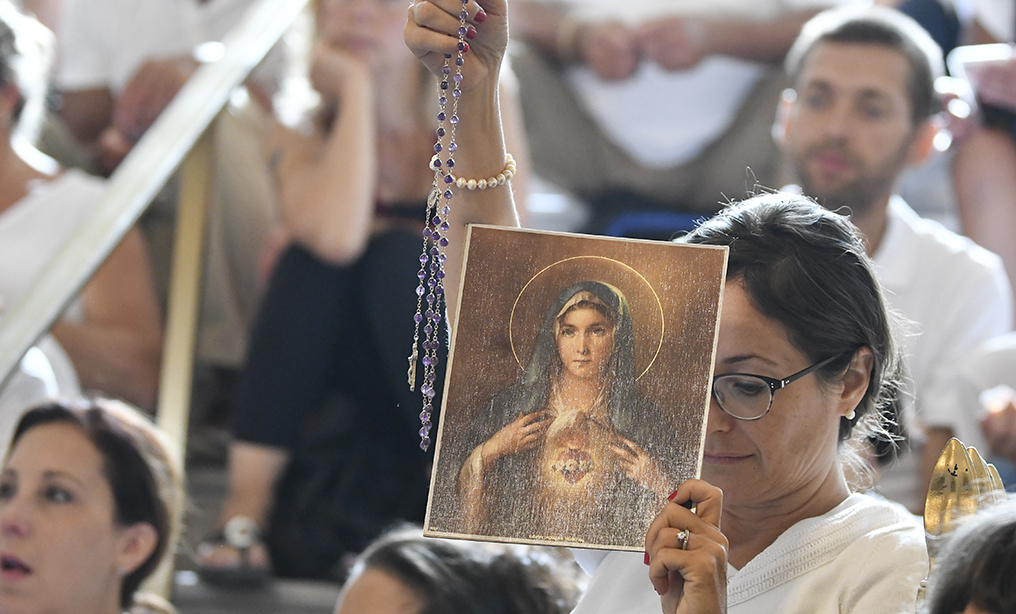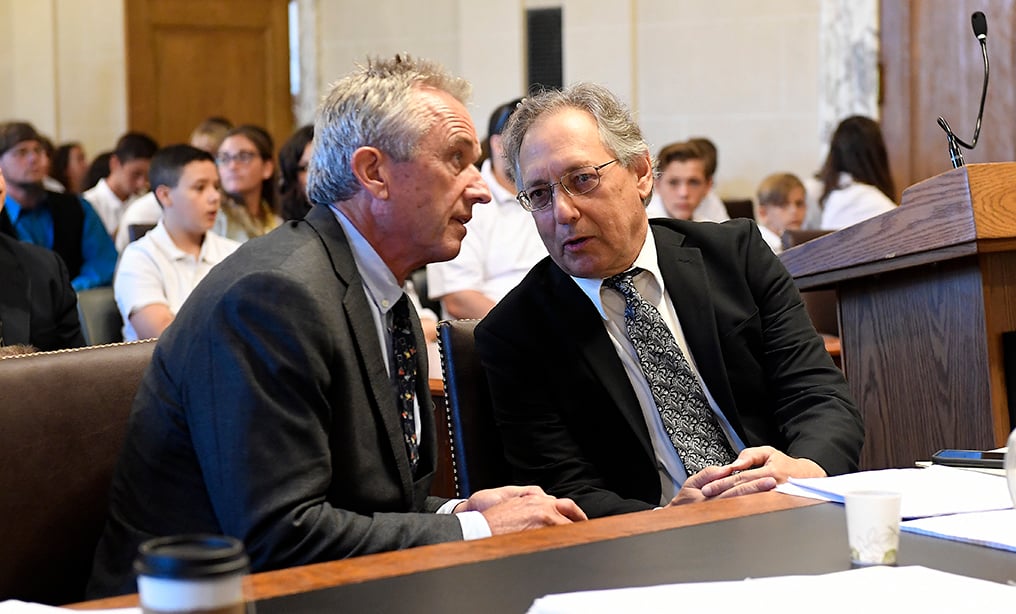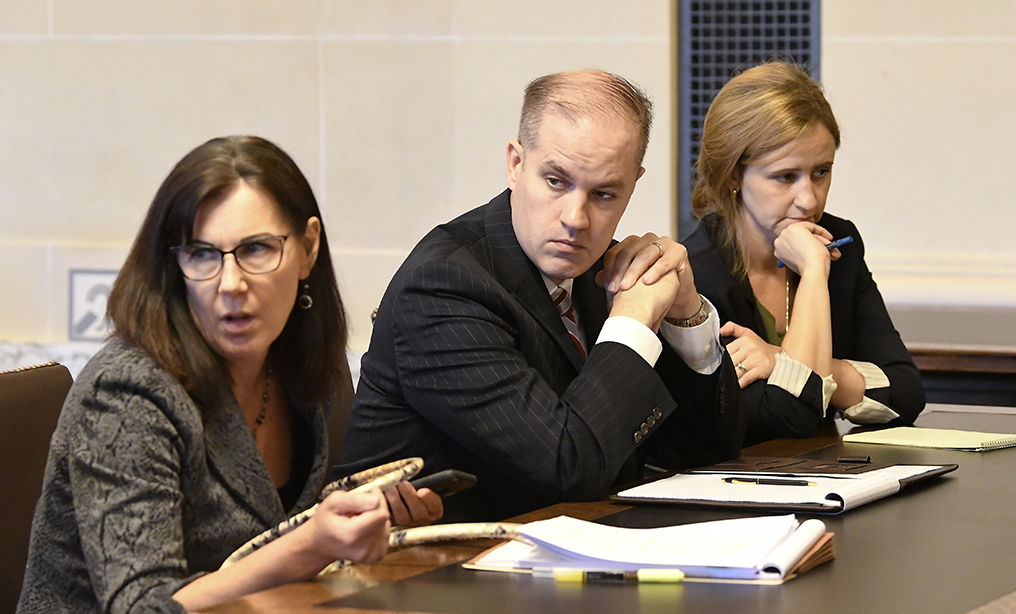Attorneys Argue for Preliminary Injunction Against Curb on Religious Exemption to NY State Vaccines Law
“What we have here in terms of a preliminary injunction are very serious issues,” said Michael Sussman, an attorney for the plaintiffs.
August 14, 2019 at 12:41 PM
6 minute read
 A woman prays during a rally outside the Albany County Courthouse on Wednesday. Photo: Hans Pennink/AP
A woman prays during a rally outside the Albany County Courthouse on Wednesday. Photo: Hans Pennink/AP
Attorneys fighting to overturn a new state law in New York that prohibits parents from seeking a religious exemption to vaccines for their children to attend school took another shot Wednesday at pausing the statute while students prepare to go back to classes in just a few short weeks.
They argued in Albany County Supreme Court that, if the law isn’t put on hold, their clients will be deprived of their right to an education, which is prescribed in the state Constitution.
“What we have here in terms of a preliminary injunction are very serious issues,” said Michael Sussman, an attorney for the plaintiffs. “The purpose of a preliminary injunction is to maintain the status quo. We have 26,000 children who in, one, two or three weeks, are going to have nowhere to go to school.”
 Attorneys Robert F. Kennedy, Jr. ,left, and Michael H. Sussman talk before the hearing at the Albany County Courthouse on Wednesday. Photo: Hans Pennink/AP
Attorneys Robert F. Kennedy, Jr. ,left, and Michael H. Sussman talk before the hearing at the Albany County Courthouse on Wednesday. Photo: Hans Pennink/APAlbany County Supreme Court Justice Denise Hartman decided not to rule from the bench on whether to enjoin the state from enforcing the law.
Sussman and Robert F. Kennedy Jr., a vocal skeptic of the safety of vaccines, are representing more than four dozen families in the lawsuit, which they filed last month in Albany County Supreme Court. They were previously denied a temporary restraining order against the state law but expect their chances of securing a preliminary injunction to be better.
Sussman argued in court Wednesday that the law, which eliminated nonmedical exemptions to vaccines for children to attend school or daycare, violated the religious freedoms of their clients and was an unnecessary course of action by the state.
He claimed, as he did in the lawsuit filed last month, that state lawmakers were motivated by hostility toward certain religious groups that sought to obtain exemptions to vaccines, rather than any threat posed to public health.
“It was a pervasive theme, and it needn’t have been,” Sussman said. “Here there was repeated references by every sponsor of the legislation in both the Assembly and the Senate in regard to religious people, whose beliefs they said were a farce … whose beliefs they said were frauds and fakes.”
 State Assistant Attorney Generals, from left, Helena Lynch and Ryan Abel, and Assistant Solicitor General Jennifer Clark wait for the start of the hearing at the Albany County Courthouse on Wednesday. Photo: Hans Pennink/AP
State Assistant Attorney Generals, from left, Helena Lynch and Ryan Abel, and Assistant Solicitor General Jennifer Clark wait for the start of the hearing at the Albany County Courthouse on Wednesday. Photo: Hans Pennink/APHelena Lynch, an assistant attorney general for New York, rebuffed that argument by pointing to the legislative history of the statute. The measure had been proposed by lawmakers in Albany for the last few years but didn’t gain steam until an outbreak of measles affected Rockland County and parts of New York City during the past year.
Lynch said the Legislature chose to act in response to that outbreak and that it had the power to do so under the state Constitution and what’s been determined through case law. She noted that, although there were no public hearings on the bill, lawmakers deferred to medical experts to advance the legislation.
“The actual legislative record is so clear that the motivation was public health,” Lynch said. “The Legislature is permitted to defer to the numerous medical associations that it did defer to, and it is permitted to act in a preventive fashion.”
The legislation was not an easy lift for members of the Legislature who supported it. The measure divided Democrats, particularly in the state Assembly, where it was just a few votes shy of not passing. That rarely happens in the chamber, which is led handily by Democrats.
Many of the lawmakers who voted against the measure, including Democrats, argued at the time that it could be interpreted as a First Amendment violation.
That also turned out to be one of the leading arguments in the lawsuit from Sussman and Kennedy.
State law in New York requires compulsory school attendance for children or some other form of education, like homeschooling. Parents can be sued or charged if they’re found to be out of compliance with that part of the law, according to the lawsuit.
The new law bars parents from sending their children to school unvaccinated, unless they’ve obtained a medical exemption. That’s created a difficult situation for parents who don’t want to vaccinate their children for religious reasons, Sussman argued.
They can either go against their religious beliefs and vaccinate their children, who would then be allowed to attend school, or they can forego the vaccination and keep their child at home. The latter option would mean their child would have to be homeschooled, which isn’t possible for every family that wants to avoid vaccination.
It could also mean pulling their children out of religious schools, attorneys have argued. The law bars children from attending any school without state-mandated vaccines, regardless of whether the institution is public, private or parochial. Medical exemptions are still allowed.
“There is no exception carved out for those individuals in any way, shape or form in New York,” Sussman argued Wednesday.
Lynch argued that, if Hartman chose to grant the preliminary injunction, it could cause more complications down the line if they prevail in defending the law. If the motion is granted, children who obtain religious exemptions to vaccines would be able to attend school. That would change down the line—at any given time—if the case ends in the state’s favor.
“If the preliminary injunction is granted and the children start school in September, the likely outcome would just be that, once the injunction is lifted, they’ll just have to be pulled out of school again,” Lynch argued. “The Legislature implemented this over the summer so this would have the least impact.”
A decision from Hartman on the motion is expected in the near future to avoid any disruption that could be caused from issuing a ruling after children have started the school year.
READ MORE:
NY State Judge Denies Temporary Restraining Order Against NY Vaccines Law
Legal Challenge Filed Against NY Law Ending Religious Exemptions for Vaccines
NY Lawmakers Approve Bill to End Religious Exemptions for Vaccines
This content has been archived. It is available through our partners, LexisNexis® and Bloomberg Law.
To view this content, please continue to their sites.
Not a Lexis Subscriber?
Subscribe Now
Not a Bloomberg Law Subscriber?
Subscribe Now
NOT FOR REPRINT
© 2025 ALM Global, LLC, All Rights Reserved. Request academic re-use from www.copyright.com. All other uses, submit a request to [email protected]. For more information visit Asset & Logo Licensing.
You Might Like
View All


Prosecutors Ask Judge to Question Charlie Javice Lawyer Over Alleged Conflict
Trending Stories
- 1White & Case KOs Claims Against Voltage Inc. in Solar Companies' Trade Dispute
- 2Avantia Publicly Announces Agentic AI Platform Ava
- 3Shifting Sands: May a Court Properly Order the Sale of the Marital Residence During a Divorce’s Pendency?
- 4Joint Custody Awards in New York – The Current Rule
- 5Paul Hastings, Recruiting From Davis Polk, Adds Capital Markets Attorney
Who Got The Work
J. Brugh Lower of Gibbons has entered an appearance for industrial equipment supplier Devco Corporation in a pending trademark infringement lawsuit. The suit, accusing the defendant of selling knock-off Graco products, was filed Dec. 18 in New Jersey District Court by Rivkin Radler on behalf of Graco Inc. and Graco Minnesota. The case, assigned to U.S. District Judge Zahid N. Quraishi, is 3:24-cv-11294, Graco Inc. et al v. Devco Corporation.
Who Got The Work
Rebecca Maller-Stein and Kent A. Yalowitz of Arnold & Porter Kaye Scholer have entered their appearances for Hanaco Venture Capital and its executives, Lior Prosor and David Frankel, in a pending securities lawsuit. The action, filed on Dec. 24 in New York Southern District Court by Zell, Aron & Co. on behalf of Goldeneye Advisors, accuses the defendants of negligently and fraudulently managing the plaintiff's $1 million investment. The case, assigned to U.S. District Judge Vernon S. Broderick, is 1:24-cv-09918, Goldeneye Advisors, LLC v. Hanaco Venture Capital, Ltd. et al.
Who Got The Work
Attorneys from A&O Shearman has stepped in as defense counsel for Toronto-Dominion Bank and other defendants in a pending securities class action. The suit, filed Dec. 11 in New York Southern District Court by Bleichmar Fonti & Auld, accuses the defendants of concealing the bank's 'pervasive' deficiencies in regards to its compliance with the Bank Secrecy Act and the quality of its anti-money laundering controls. The case, assigned to U.S. District Judge Arun Subramanian, is 1:24-cv-09445, Gonzalez v. The Toronto-Dominion Bank et al.
Who Got The Work
Crown Castle International, a Pennsylvania company providing shared communications infrastructure, has turned to Luke D. Wolf of Gordon Rees Scully Mansukhani to fend off a pending breach-of-contract lawsuit. The court action, filed Nov. 25 in Michigan Eastern District Court by Hooper Hathaway PC on behalf of The Town Residences LLC, accuses Crown Castle of failing to transfer approximately $30,000 in utility payments from T-Mobile in breach of a roof-top lease and assignment agreement. The case, assigned to U.S. District Judge Susan K. Declercq, is 2:24-cv-13131, The Town Residences LLC v. T-Mobile US, Inc. et al.
Who Got The Work
Wilfred P. Coronato and Daniel M. Schwartz of McCarter & English have stepped in as defense counsel to Electrolux Home Products Inc. in a pending product liability lawsuit. The court action, filed Nov. 26 in New York Eastern District Court by Poulos Lopiccolo PC and Nagel Rice LLP on behalf of David Stern, alleges that the defendant's refrigerators’ drawers and shelving repeatedly break and fall apart within months after purchase. The case, assigned to U.S. District Judge Joan M. Azrack, is 2:24-cv-08204, Stern v. Electrolux Home Products, Inc.
Featured Firms
Law Offices of Gary Martin Hays & Associates, P.C.
(470) 294-1674
Law Offices of Mark E. Salomone
(857) 444-6468
Smith & Hassler
(713) 739-1250







